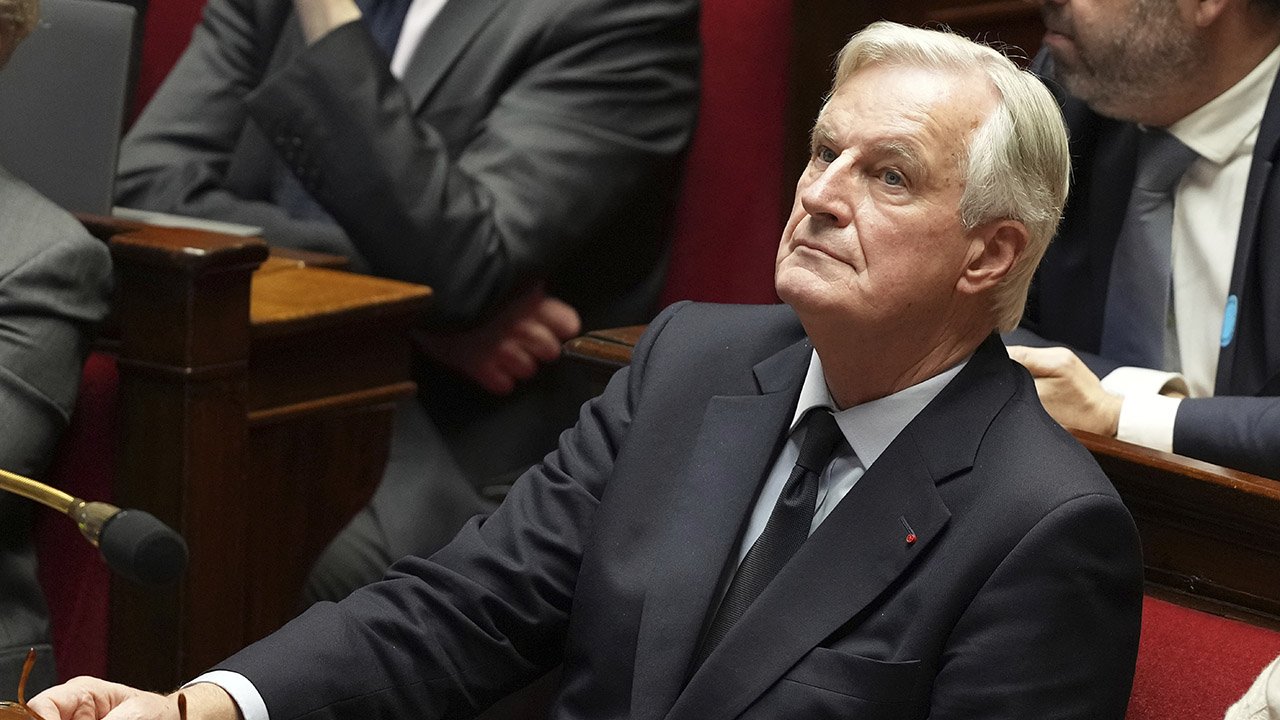France's minority government faces a crucial no-confidence vote, potentially leading to its collapse and unprecedented political instability. (AP/Michel Euler)

- Opposition lawmakers from left and far right unite to challenge Prime Minister Barnier's Cabinet in a no-confidence vote.
- If successful, the motion would result in the shortest-lived government in France's modern history, forcing Macron to appoint a new PM.
- Political instability could have significant economic consequences, potentially increasing France's deficit and complicating major reforms.
Share
|
Getting your Trinity Audio player ready...
|
PARIS — France’s minority government appeared to be in its final hours Tuesday as opposition lawmakers from the left and the far right vowed to topple Prime Minister Michel Barnier’s Cabinet.
A no-confidence vote is scheduled Wednesday in parliament in the wake of a divisive budget debate, with a strong chance of being successful.
If the motion passes, Barnier’s Cabinet would be the shortest-lived government in France’s modern history, marking an unprecedented period of political instability.
President Emmanuel Macron would be in charge of appointing a new prime minister.
A Divided National Assembly
Following the June-July parliamentary elections, the National Assembly, France’s powerful lower house of parliament, is divided into three major blocs: a left-wing coalition known as the New Popular Front, Macron’s centrist allies and the far-right National Rally party. None won an outright majority.
In September, Macron asked Barnier, a conservative, to form a government dominated by Republicans and centrists — implicitly relying on the far right’s goodwill to be able to stay in power.
However, far-right leader Marine Le Pen now says her party will vote for bringing the government down, accusing Barnier of ignoring her demands.
Meanwhile, the left-wing coalition denounces an “austerity budget” and criticizes “the absence of dialogue and disregard for parliamentary work.”
The National Assembly said the no-confidence motion requires a majority of the votes to pass — or at least 288 of 574 lawmakers currently in office.
Altogether, the left and the far right count over 330 lawmakers — yet some may abstain from voting.
Related Story: A Boat With Dozens of Migrants Rips Apart in the English Channel Off France, ...
Potential Consequences of Government Collapse
Wednesday could see the first no-confidence motion succeed in over six decades.
If the government falls, Macron could ask outgoing ministers to handle current affairs pending the appointment of a new prime minister.
The parliament’s fractured composition would remain the same. No new legislative elections can be held before July, because under the French Constitution, the National Assembly must remain in place for a minimum of one year.
No favorite figure to replace Barnier has emerged yet. Macron could pick a politician from his centrist alliance, French media report.
The New Popular Front asks for a left-wing Cabinet to be appointed instead.
Some opposition lawmakers are calling for Macron to resign, but the French president has previously ruled out that option.
Related Story: Middle East Latest: Israeli Minister Warns of Wider Strikes on Lebanon if ...
Budget Implications
France is at no risk of a government shutdown that in the United States would disrupt many services and squeeze federal employees.
An outgoing government could present a special law to levy taxes from Jan. 1, based on this year’s rules. It would also be able to decide on renewing spending by decree in order to pay civil servants, pensions and other key government expenses.
However, this would suspend any potential tax hike — like one initially expected on big companies — and freeze any new spending.
In particular, an additional 3.3 billion euro ($3.5 billion) package for the French military was planned as the country supports Ukraine in its war against Russia.
Later, a new government could present its own budget proposals at parliament.
Related Story: Paris Conference for Lebanon Raises $1 Billion in Pledges for Humanitarian and ...
Market Concerns and Economic Pressure
In a last-ditch effort to save his government, Barnier warned of “a big storm and very serious turbulence on the financial markets.”
France is under pressure from the European Union’s executive body to reduce its colossal debt. The country’s deficit is estimated to reach 6% of gross domestic product this year and analysts say it could rise to 7% next year without drastic adjustments.
The political instability could push up French interest rates, digging the debt even further.
In addition, without a clear parliamentary majority, no major reform appears within the reach of a new government.
RELATED TOPICS:
Categories

Mountain Lion Trio Caught on Camera in Shaver Lake



















